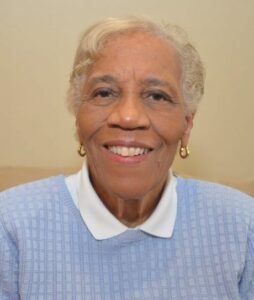By Serena Howlett, Contributing Writer

Photo/submitted
Quincy – In the spring of 1956 a new member of the US Air Force Nurse Corps was ordered to report for basic training in Montgomery, Ala. The young nurse, named Edna, traveled by train from Wilmington, Del. to Montgomery. A doctor on the train, also headed to the Air Force base, offered to carry her bags. Together, they entered the station. Upon setting foot in the busy passenger waiting room, all chatter and activity ended abruptly. The doctor was white; the nurse was black. A few minutes later taxi drivers ignored the doctor as he stood on the curb with the nurse and their bags. Reentering the station to call the base for transportation, the doctor encountered a white policeman, who threatened him with arrest and worse, if he came back. Welcome to the Deep South.
Edna Pruce (née Wilson) was not taken aback by the treatment she received at the train station. She had grown up in an economically comfortable, education-oriented family. In her childhood she and her parents had lived in a large house owned by her grandparents. But her hometown of Wilmington was racially segregated: “segregated housing, segregated schools, segregated lunch counters, segregated movies,” she recalled. On the basis of race, she had been rejected from all nursing schools in the state of Delaware. Undaunted, she earned a nursing diploma at the highly-respected Freedman Hospital School of Nursing at Howard University.
Montgomery was a life-changing experience. Although Pruce lived in the Air Force dormitory for nurses, she witnessed the civil rights movement with her own eyes and ears. On the first day of December in the previous year, Rosa Parks, a seamstress, refused to stand up when the white bus driver ordered her to give her seat to a white passenger. Parks’ arrest sparked the Montgomery Bus Boycott, which lasted for 381 days — until the U.S. Supreme Court declared segregated transit unconstitutional. On Thursday evenings, while the bus boycott was in progress, Pruce heard the young Martin Luther King, Jr. exhort his listeners to protest segregation (“to be saved from that patience that makes us patient with anything less than freedom and justice.”). Pruce’s front row seat at this turning point in the history of civil rights has informed her work to this day.
When the Air Force stationed Pruce in the UK, another transformative event took place. This time it was highly personal. Observing Pruce at a Baháʼí conference at Oxford University, a divinity student fell in love. Not finding her when the conference ended, he made a frantic search and finally caught up with her as she left a Woolworth store. After showing her the sights, he invited her to his room for tea. Their subsequent interracial engagement caught media attention and the couple received over 350 letters from all over Commonwealth and America. They were married on Christmas Eve 1960.
While still in England Pruce had written to Massachusetts General Hospital about her plans to return to the United States. MGH invited her for an interview. In 1964 she became the first black nurse to work in the MGH Outpatient Clinics.
After many years of nursing Pruce was ready for a change and returned to college. She earned a bachelor degree in health education in 1967 and a master’s degree in Counseling Psychology in 1968, both at Boston University.
Over the following decades, Pruce filled many roles. Between 1979 and 1995, she held the position of Associate Dean of Students at Northeastern University. She became president of the first organized YWCA. She was appointed to the Board of Trustees at Bunker Hill Community College. She served as president of Boston Senior Home Care and she is currently a member of the Ethos Board of Directors.
Pruce has inspired many to take action and such actions have improved the lives of many people. As president of the Massachusetts Senior Action Council (MSAC), her most recent accomplishment is inclusion of a measure to expand access to the federal Medicare Savings Plan in the 2020 budget. The expanded program, which reduces the cost of premiums and prescription drugs, will cover seniors with incomes up to 165 percent of the poverty level. Under Pruce’s leadership, MSAC members will continue to advocate for the program to cover a greater number of low-income seniors.
In 2019 State Representative Dan Cullinane nominated Pruce for the Massachusetts Status of Women’s Unsung Heroine award.
Pruce continues to exemplify the words of Rosa Parks, “Each person must live their life as a model for others”.













